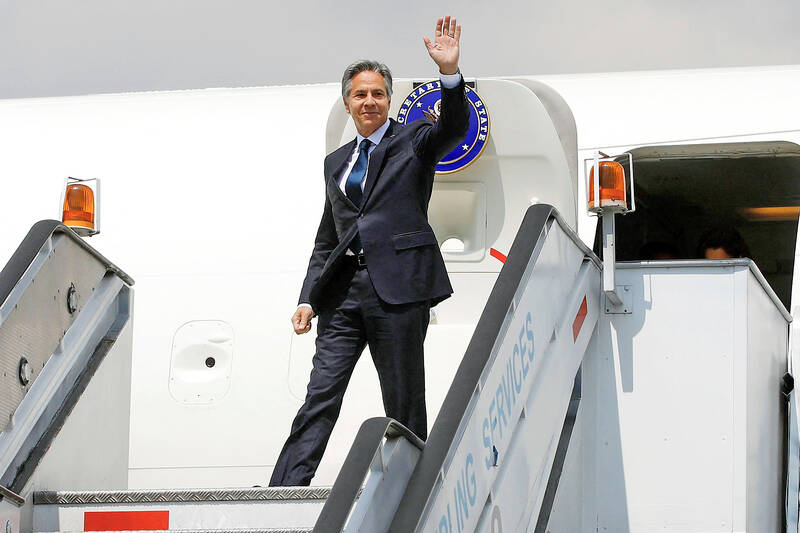The US on Monday invited Mexico to join a multibillion-dollar push to boost semiconductor manufacturing to compete with China, during a visit by US Secretary of State Antony Blinken for high-level economic talks.
Officials set aside trade tensions over Mexican President Andres Manuel Lopez Obrador’s energy policies, and focused instead on the potential benefits from cooperation in microchips and other technology.
The Creating Helpful Incentives to Produce Semiconductors and Science Act, which US President Joe Biden signed into law last month, includes about US$52 billion to promote production of microchips.

Photo: AFP
“Now in China and Taiwan the testing, packaging and assembly industry for semiconductors is a US$60 billion industry. In North America it’s US$3 billion,” said US Secretary of Commerce Gina Raimondo, who accompanied Blinken.
“So we’re really very excited about the opportunities for job creation in Mexico and in the United States,” she added.
“The opportunity for Mexico is not just in the manufacturing facilities, but in testing, packaging and assembly,” Raimondo told reporters.
Mexican Minister of Foreign Affairs Marcelo Ebrard welcomed the US offer to cooperate in semiconductors as “very generous.”
The two sides struck a conciliatory tone when asked about Lopez Obrador’s energy reform efforts, which face opposition from the US and Canada.
Washington in July filed a formal complaint against Mexico under a North American free trade agreement, saying its energy policies discriminated against US firms.
“Dispute settlement under international agreements is a normal part of trade relationships even among the closest of partners,” Blinken said.
“We’re moving full speed ahead in the further integration of our economies and in building the most competitive region in the world. And we’re doing that as you heard through the work on supply chains, on strengthening the work we’re doing together in building a clean energy economy, the work on semiconductors, etc,” he added.
Earlier, Lopez Obrador welcomed the tone of a recent letter from Biden, saying Mexico appreciated its “respectful attitude” compared with the trade complaint, which he described as “not the most diplomatic.”
Lopez Obrador’s push to roll back the effects of liberalization that he says benefited private companies has alarmed foreign investors and environmentalists, who see the moves as favoring fossil fuels over renewable energy.
Washington has requested consultations about the energy dispute under the US-Mexico-Canada Agreement, the first step in a process that could lead to retaliation over actions it says harm US firms and impedes development of clean energy.
Blinken met with Lopez Obrador ahead of the economic talks and discussed issues including cooperation to deal with irregular migration and the synthetic opioid fentanyl, the US Department of State said.
“They also spoke about joint efforts to tackle the climate crisis through investments in clean energy and emerging technologies like electric vehicles, solar technologies, and semiconductors,” a statement said.

Vincent Wei led fellow Singaporean farmers around an empty Malaysian plot, laying out plans for a greenhouse and rows of leafy vegetables. What he pitched was not just space for crops, but a lifeline for growers struggling to make ends meet in a city-state with high prices and little vacant land. The future agriculture hub is part of a joint special economic zone launched last year by the two neighbors, expected to cost US$123 million and produce 10,000 tonnes of fresh produce annually. It is attracting Singaporean farmers with promises of cheaper land, labor and energy just over the border.

US actor Matthew McConaughey has filed recordings of his image and voice with US patent authorities to protect them from unauthorized usage by artificial intelligence (AI) platforms, a representative said earlier this week. Several video clips and audio recordings were registered by the commercial arm of the Just Keep Livin’ Foundation, a non-profit created by the Oscar-winning actor and his wife, Camila, according to the US Patent and Trademark Office database. Many artists are increasingly concerned about the uncontrolled use of their image via generative AI since the rollout of ChatGPT and other AI-powered tools. Several US states have adopted

A proposed billionaires’ tax in California has ignited a political uproar in Silicon Valley, with tech titans threatening to leave the state while California Governor Gavin Newsom of the Democratic Party maneuvers to defeat a levy that he fears would lead to an exodus of wealth. A technology mecca, California has more billionaires than any other US state — a few hundred, by some estimates. About half its personal income tax revenue, a financial backbone in the nearly US$350 billion budget, comes from the top 1 percent of earners. A large healthcare union is attempting to place a proposal before

KEEPING UP: The acquisition of a cleanroom in Taiwan would enable Micron to increase production in a market where demand continues to outpace supply, a Micron official said Micron Technology Inc has signed a letter of intent to buy a fabrication site in Taiwan from Powerchip Semiconductor Manufacturing Corp (力積電) for US$1.8 billion to expand its production of memory chips. Micron would take control of the P5 site in Miaoli County’s Tongluo Township (銅鑼) and plans to ramp up DRAM production in phases after the transaction closes in the second quarter, the company said in a statement on Saturday. The acquisition includes an existing 12 inch fab cleanroom of 27,871m2 and would further position Micron to address growing global demand for memory solutions, the company said. Micron expects the transaction to